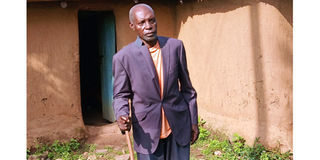Prime
I thought they would still be here: 99-year-old returns home after six decades in Uganda

Mzee Boniface Muhandia, 99, who ran away from home 60 years ago, has returned home.
Kakamega. Residents of Eshisari village in East Mumias were left in disbelief this past weekend after a 99-year-old man, who disappeared from his home 60 years ago, returned unexpectedly—walking stick in hand and carrying nothing more than a small suitcase.
Boniface Muhandia, who left the village in 1965 at the age of 39 in search of work in Uganda, has been missing for so long that many of his relatives assumed he had died. His return, more than half a century later, has reopened old wounds and stirred emotions in a community that had long given up hope of ever seeing him again.
Now frail and confused, Mzee Muhandia recounted how, after training as a mason in Kenya, he struggled to find employment. In search of better opportunities, he crossed the border into Uganda, where he eventually settled and lived for decades. “I worked for many years in Kampala, and people appreciated my dedication and the quality of my work,” he said. “That’s how I managed to stay in Uganda for so long.”
His homecoming, however, was bittersweet.
“I came back to reunite with my family, but I was shocked to find many of them had passed on while I was away. I thought I would find them and be with them again—I didn’t expect to miss my wife and some of my children,” said the soft-spoken centenarian.
Muhandia’s wife, Kelemendia Adhiambo, had briefly joined him in Uganda in the late 1970s but returned to Kenya soon after to care for their children. During her time in Uganda, she bore two more children—a son and a daughter—before returning home permanently. She passed away two years ago. Muhandia never attended her funeral.
Two of the couple’s sons also died in the late 1990s. With the passage of time, even the surviving children had difficulty recognizing their long-lost father when he walked back into their lives.
“Although I used to send letters through the postal service, I eventually lost contact with my family,” he said. “That’s why I never heard about the deaths.”
Now visibly disoriented and struggling to recall the last time he communicated with his family, Mzee Muhandia is being cared for by his youngest son, Protus Makokha, who is planning to build him a new home.
For the villagers, Muhandia’s story is one of mystery, endurance, and painful reunions—a reminder of how migration, while sometimes necessary, can leave deep emotional scars across generations.



